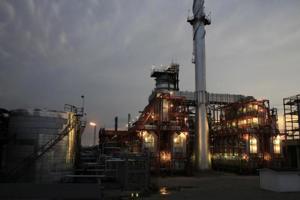Mexico's Pemex to launch coking plant tender for Tula refinery
MEXICO CITY (Reuters) -- Mexican state oil company Pemex expects to launch a tender in the next few weeks to find a partner to develop and operate a new coking plant at its Tula refinery, a $2.1 B project designed to boost output of gasoline, a company source said.
Japan's Mitzui & Co, South Korea's SK, Italy's Eni, China's PetroChina Co Ltd and Sinopec, and international oil majors Royal Dutch Shell Plc and Chevron Corp have all expressed interest, the source said.
Two years of sagging oil prices and mounting debt have forced the Mexican oil firm to seek equity partners to help fund key projects.
The new plant will be located adjacent to Pemex's existing Tula refinery, in the central state of Hidalgo.
The facility, Pemex's second largest among six domestic refineries, can process 315,000 bpd of crude, but is currently processing just 195,000 bpd, or only 62% of its capacity, according to the latest Pemex data.
Tula, like two other Pemex refineries, lacks coking capacity, which boosts production of higher-value fuels like gasoline from Mexico's increasingly heavy crude production.
In 2015, Pemex said it signed a contract with ICA Fluor for engineering, procurement and construction for an initial phase of projects to boost gasoline and diesel output and reduce fuel oil output by building a coking plant. Reuters was not able to confirm the status of the project with ICA Fluor, a joint venture between construction firm ICA and Fluor Corp.
In 2016, the state-owned oil company presented a business plan that included the "Tolling coker Tula Alliance" project, as well as partnerships to improve operations and/or reconfigure the Tula, Salamanca and Salina Cruz refineries.
Pemex has often said it is looking for partners to improve the performance of its refineries, which currently process about 915,000 bpd of crude, well below their combined capacity of 1.6 MMbpd.
Reporting by Mexico City Newsroom; Editing by Lisa Shumaker







Comments